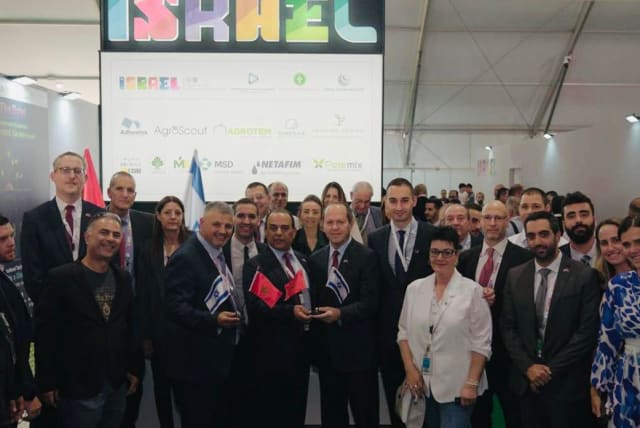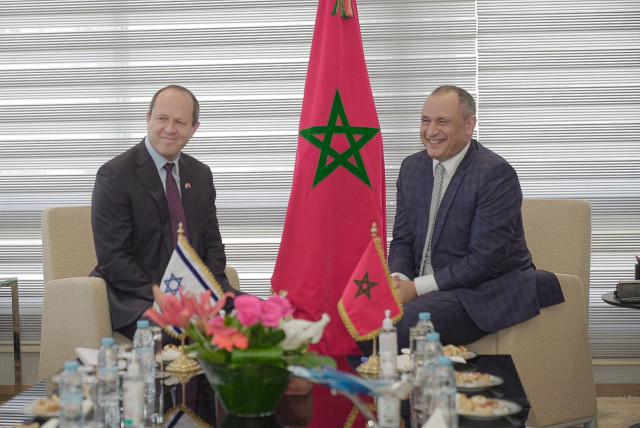Israeli, Moroccan agricultural collaboration could make Africa bloom

Economy Minister Nir Barkat announces plans to open an economic attaché's office in Morocco.
Israel and Morocco are set to forge increased ties in the water, desert and marine agriculture fields following a visit to Morocco by Economy Minister Nir Barkat last week.
The minister was in the country for SIAM, the largest international agricultural exhibition in Morocco and one of the largest in Africa. The event was held in Meknes. While there, Barkat met with recently appointed Moroccan Minister of Agriculture Mohammed Sadiki.
Barkat confirmed for Sadiki that Israel would open an economic attaché's office in Morocco in the coming months. Already, Israel recently nominated Jamal Medlij as its agricultural attaché to Morocco.
What did Israel's Economy Minister Nir Barkat say in Morocco?
Barkat was the first minister to visit Morocco since the establishment of the new Israeli government.
"Forty percent of Morocco's economy relies on the agricultural sector," Barkat said. "In Israel, we have world-class technologies in the fields of water and desert and marine agriculture that could catapult Morocco's agriculture sector to new regional and global heights. Against the background of global economic and climate uncertainty, we must help each other and rely on the achievements of technology to ensure the continued prosperity of the populations in Israel and Morocco."
Einat Levi, an expert on Israeli Moroccan relations based in Rabat, who formerly led Economic Affairs for Israeli Mission to Morocco, explained that agriculture is "rooted deep in the cultural and economical DNA of both countries." She said Morocco could benefit from Israeli technologies that improve crops, reduce the use of resources like water and fertilizers, and provide expertise in areas such as desert fish farming.
She said Morocco could assist Israel by opening new markets to Israeli companies, especially in Africa. Moreover, Morocco could provide Israeli farmers who wish to set up private farms in the country preferential conditions such as subsidies on irrigation, taxation, land lease and more.
"Some Israeli and Moroccan agricultural institutions and universities have already signed cooperation agreements and conduct joint research, student and faculty exchanges and joint conferences," Levi noted. "Israel can help generate more start-ups in Morocco and transfer academic knowledge to business."
However, she added that seeing the full potential come to fruition depends on finalizing the economic infrastructure between the countries, including a series of agreements still waiting to be signed, such as a potential free trade agreement.
Before meeting with Sadiki, Barkat inaugurated the first official Israeli pavilion at SIAM. The conference has been taking place for 15 years.
The event brought together around 850,000 visitors and exhibitors from 60 countries, including 10 Israeli companies who exhibited and many others who came to network. Among the leading Israeli companies on the ground were Israel's Netafim, which focuses on irrigation, and SupPlant, which uses advanced algorithms to analyze plant data. Both of these companies are already operating in Morocco.
Barkat delivered a talk on "Addressing Global Food & Agriculture Challenges with Israeli Innovation" during a breakout session.
"I enjoyed watching the local Moroccan visitors approaching the Israeli companies and their reactions, which were overall curious and positive," Levi told The Jerusalem Post.
Meknes also has significance for Israel and the Jewish community, Levi explained. Jews lived in the area for centuries before the establishment of the State of Israel, when many fled for religious reasons and fear of prosecution.
"I visited Meknes for the first time in January 2013 and found the family houses in the Mellah, where the Jews used to live for centuries, and the family graves at the Jewish cemetery where there is also our family-known Jewish saint, Rabbi Daoud Boussidan. For all these years, Meknes was mostly a nostalgic destination and symbol of our lost past that is not due to return," Levi said. "Coming back to Meknes, but this time for a significant economic event such as SIAM, and with the official participation of Israeli companies as part of a national pavilion, felt like a change of direction in history.
"Instead of looking backward, we are now looking forward, transforming longing and nostalgia into reality... We still have so much to accomplish."
The Environment and Climate Change portal is produced in cooperation with the Goldman Sonnenfeldt School of Sustainability and Climate Change at Ben-Gurion University of the Negev. The Jerusalem Post maintains all editorial decisions related to the content.
Jerusalem Post Store
`; document.getElementById("linkPremium").innerHTML = cont; var divWithLink = document.getElementById("premium-link"); if (divWithLink !== null && divWithLink !== 'undefined') { divWithLink.style.border = "solid 1px #cb0f3e"; divWithLink.style.textAlign = "center"; divWithLink.style.marginBottom = "15px"; divWithLink.style.marginTop = "15px"; divWithLink.style.width = "100%"; divWithLink.style.backgroundColor = "#122952"; divWithLink.style.color = "#ffffff"; divWithLink.style.lineHeight = "1.5"; } } (function (v, i) { });

